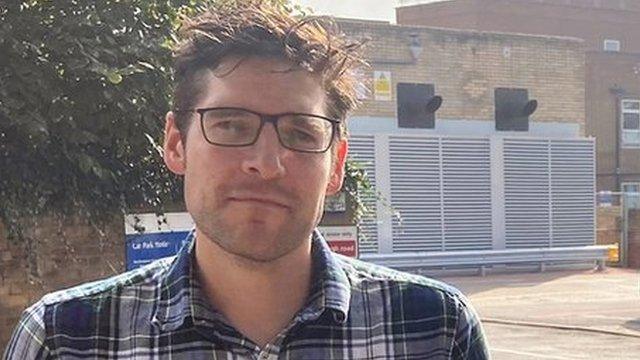COP26: Facing up to the challenge of retrofitting homes
- Published
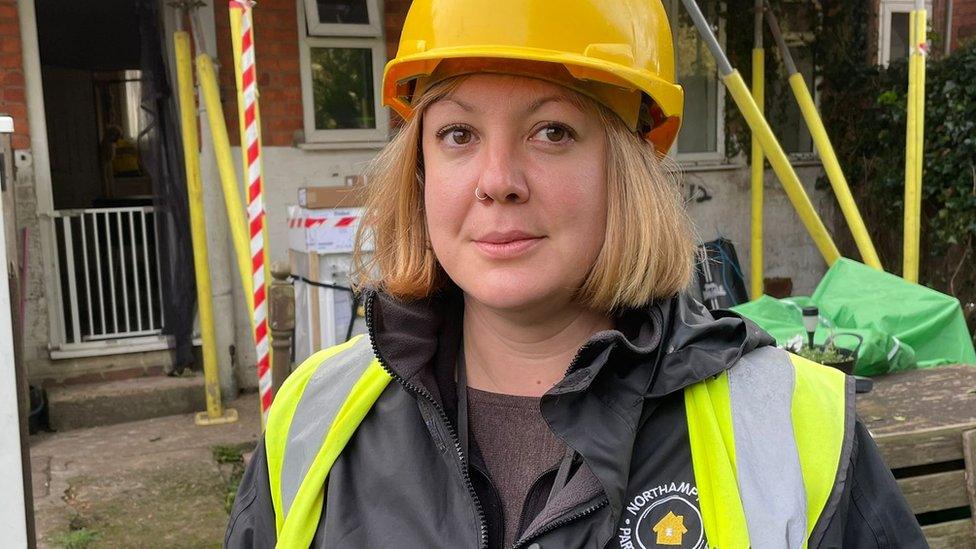
Laura Elliott says Northampton Partnership Homes has found residents have been keen to embrace eco-friendly improvements
Making houses greener is an important government target if the pledges coming out of COP26 are to be achieved, but just how big is the challenge of retrofitting our homes?
People in Northampton, says Laura Elliott, are on board with the idea of energy-efficient, eco-friendly homes.
She is a project manager for Northampton Partnership Homes (NPH), which manages West Northamptonshire Council's social housing stock.
NPH is currently working to retrofit 150 homes in the town to make them as environmentally friendly as possible.
While such projects aim to be a first step along a path to help realise the government's pledge of reaching net-zero carbon by 2050, it is not always easy.

'Very old houses'
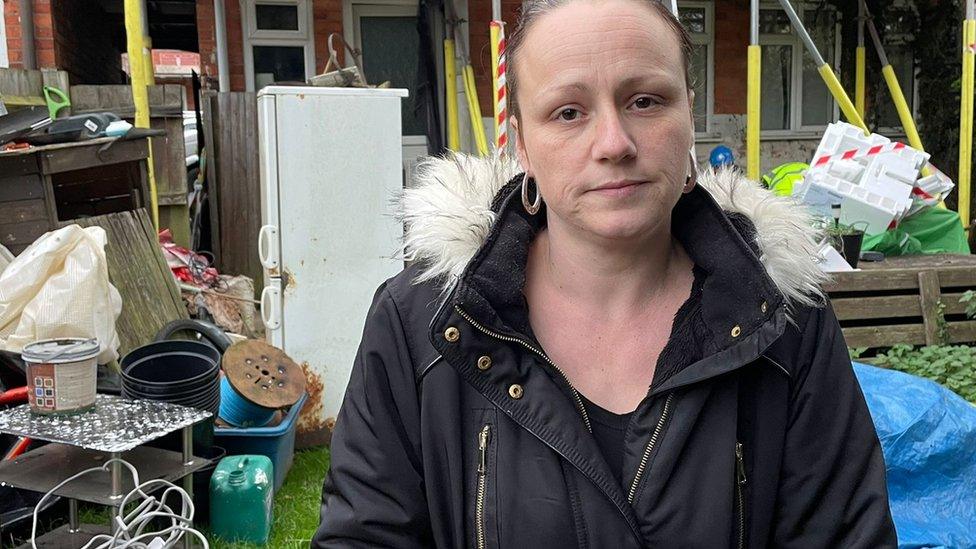
Emma Ratcliffe says her home currently loses heat through the walls, doors and windows
Emma Ratcliffe has lived in her "not very warm" two-bedroom home in Northampton for nine years.
"The windows are old," she says. "These are very old houses, with old heating systems.
"I'm paying for heat that's going straight back out through the gaps in doors and windows."
She is full of praise for the retrofitting scheme which she says will save her between £50 and £70 a week, and is "good for the carbon footprint as well".

'Heat leaking through walls'
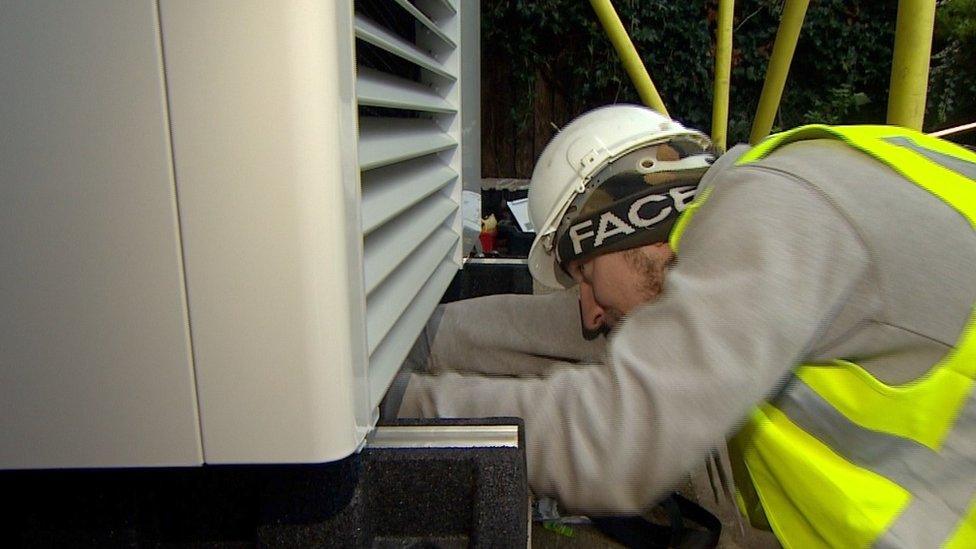
Improvements to 150 homes in Northampton will include better insulation and ventilation, solar panels and new heating systems
Northampton's Whole House Retrofit Project will cost around £7.5m, with £3m coming from the government.
The scheme targets homes built in the 1920s, which are expensive to heat and relatively energy inefficient.
Residents will benefit from improved insulation, solar panels, upgraded central heating systems and better ventilation - all resulting in lower energy bills and greater energy efficiency.
About £60,000 will be spent on each of the 150 homes.
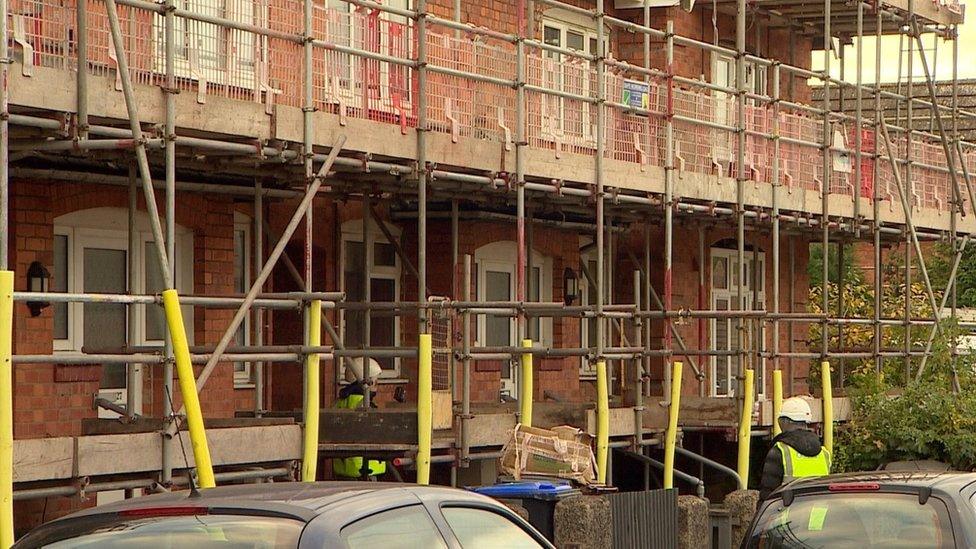
The government's Social Housing Decarbonisation Fund has contributed £3m to the cost of retrofitting 150 Northampton homes
Laura Elliott says it is about taking "a whole house approach".
"The intention is to make the homes much more comfortable for our residents," she says.
"The heat of these properties leaks through the walls at the moment.
"By insulating it we stop that, and stop the demand for heating."

'So many idiosyncrasies'
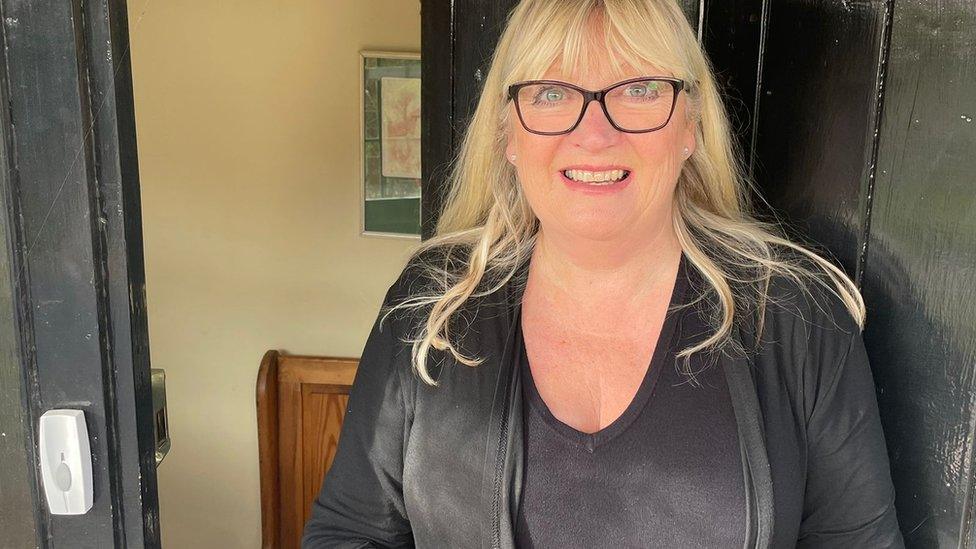
Anne Murphy says she has been inspired by COP26 and passionate climate change advocates
Across the county border at a 400-year-old thatched property in Great Stukeley in Cambridgeshire, Anne Murphy says "watching COP26 and some of the more impressive youngsters - they prod my conscience a little bit".
However, she says retrofitting her four-bedroom cottage comes with its own challenges.
That's not to say she's not a willing convert to the idea of creating an eco-friendly home.

The oil central heating system in Anne Murphy's thatched cottage is a retrofitting challenge
"We've all got to do our bit," she says. "I'm looking at things like draft excluders, the letterbox and back door.
"I'd definitely welcome advice on alternative forms of heating to the oil burner."
She has already had work completed on the property, including double glazing and loft insulation.
The home's oil central heating is one challenge - "clearly I can't go to gas" - while she says she has been told the age of the property means a heat pump would not be effective, because the device works by transferring thermal energy from a cooler space to a warmer space using a refrigeration cycle.
"They believe it would be difficult to use," she says. "It needs completely insulated rooms and none of mine are because of the age of the doors - the ill-fit of the doors.
"They give it character, but don't help if you are trying to keep a room entirely insulated."

'An enormous problem'
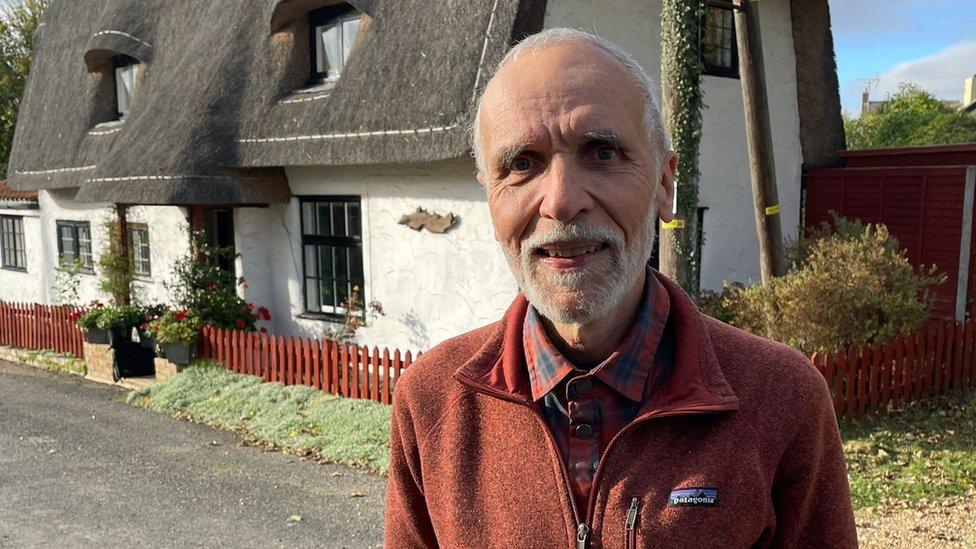
Tom Bragg says he has retrofitted hundreds of homes
Cambridge Carbon Footprint is an organisation which "works to raise awareness of climate change issues and to support people in moving to low-carbon living".
"We help people and organisations cut back their carbon footprints," says Tom Bragg, one of its members.
He says there is currently very little support out there, either financially or in information terms, for those who want to make their homes eco-friendly.
"We've really got to find a way to up our game," he says.
"The key thing in most homes is to get them well insulated and then look if you can improve the source of heating.
"There are about 20 million older homes in Britain that need some sort of retrofit improvement.
"It's an enormous problem and we are scratching the surface at the moment."
He says some of the biggest issues are a lack of trained people to evaluate homes and fit them out correctly, and the cost to owners.
"Cost is a barrier," he says.
"For most homes there are some simple low-cost measures like draft-proofing or turning down your thermostat, but we will need government help."

'A small start on a long journey'
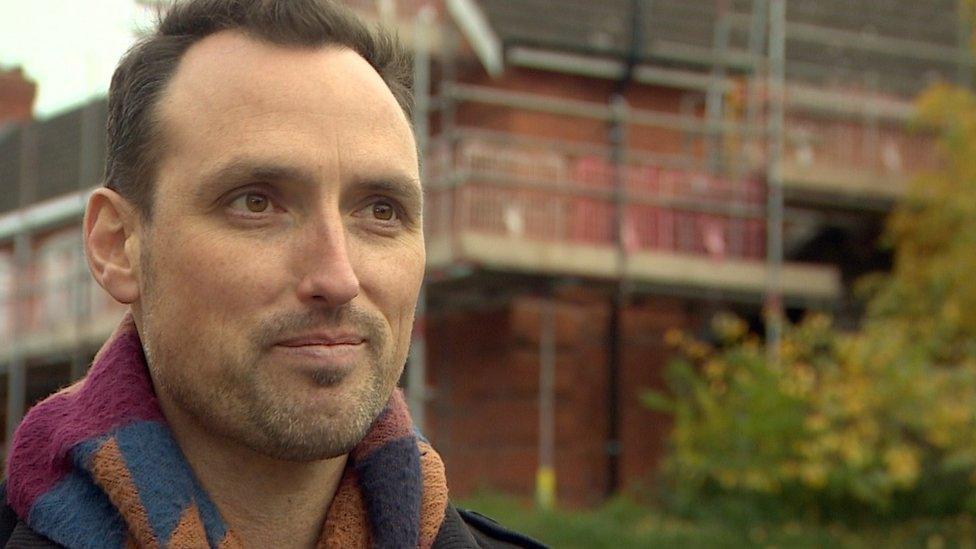
Paul Tucker says changes to the way grid electricity is supplied in the future will help the Northampton homes become more efficient
Back in Northampton, Paul Tucker, NPH's sustainability manager, has high hopes that their retrofitting scheme will have a major effect.
"In terms of the carbon footprint, we expect theses changes should reduce it by something like 70%," he says.
"They'll not quite be zero carbon houses, but we could almost call them zero carbon ready.
"With improvements in grid electricity over the next few decades they'll become really, really efficient homes."
'Investing £6.6bn'
Mr Tucker says NPH currently looks after 12,000 homes.
After the work on the 150 homes is finished, he says the plan is to retrofit "around three times as many" next year, before "gradually ramping it up" to tackle their entire housing stock.
"This is quite a small start to what is a long journey," he says.
A spokesman for the Department for Business, Energy and Industrial Strategy (BEIS) says: "Huge progress is already being made in improving the energy efficiency of UK homes, and we are investing almost £6.6bn to support people to install energy efficiency measures to help reduce monthly energy bills.
"We have set out plans to support low income households in particular, ensuring they are some of the earliest to benefit from the move to net zero."

Find BBC News: East of England on Facebook, external, Instagram, external and Twitter, external. If you have a story suggestion email eastofenglandnews@bbc.co.uk, external
- Published6 November 2021
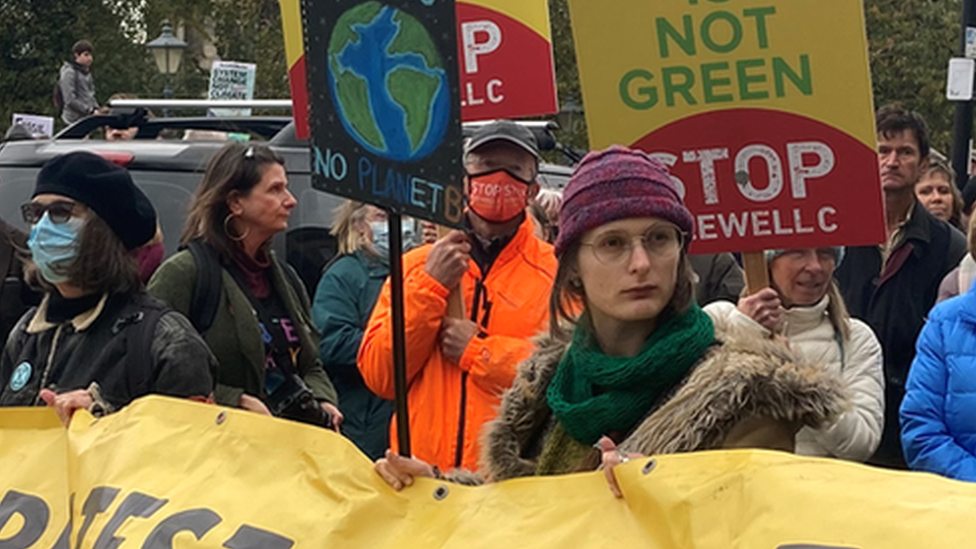
- Published3 November 2021

- Published2 November 2021
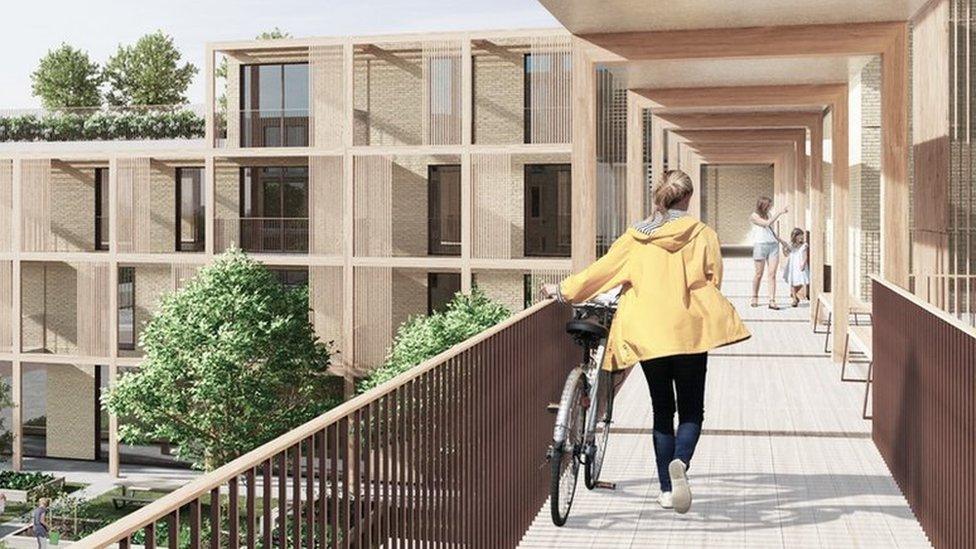
- Published28 October 2021
